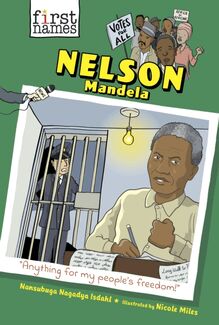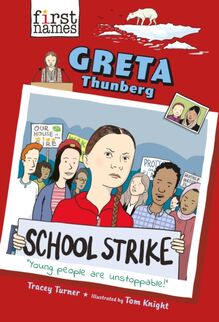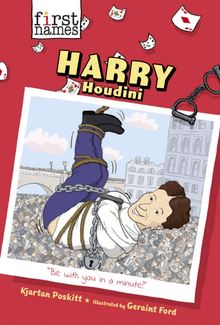Ada Lovelace (The First Names Series) , livre ebook
98
pages
English
Ebooks
2020
Vous pourrez modifier la taille du texte de cet ouvrage
Obtenez un accès à la bibliothèque pour le consulter en ligne En savoir plus
Découvre YouScribe en t'inscrivant gratuitement
Découvre YouScribe en t'inscrivant gratuitement
98
pages
English
Ebooks
2020
Vous pourrez modifier la taille du texte de cet ouvrage
Obtenez un accès à la bibliothèque pour le consulter en ligne En savoir plus
Publié par
Date de parution
31 mars 2020
Nombre de lectures
0
EAN13
9781683358695
Langue
English
Poids de l'ouvrage
4 Mo
Publié par
Date de parution
31 mars 2020
Nombre de lectures
0
EAN13
9781683358695
Langue
English
Poids de l'ouvrage
4 Mo
The facts in First Names: Ada Lovelace have been carefully checked and are accurate to the best of our knowledge, but if you spot something you think may be incorrect, please let us know. Some of the passages in this book are actual quotes from Ada and other important people. You ll be able to tell which ones they are by the style of type: I awoke one morning and found myself famous .
Library of Congress Control Number 2019950354
ISBN 978-1-4197-4075-6 eISBN 978-1-68335-869-5
Text copyright 2020 Ben Jeapes Illustrations copyright 2020 Nick Ward Book design by Charice Silverman
2019 as U.K. edition. First published in 2019 by David Fickling Books Limited
Published under license from David Fickling Books Limited. Published in 2020 by Abrams Books for Young Readers, an imprint of ABRAMS. All rights reserved. No portion of this bok may be reproduced, stored in a retrieval system, or transmitted in any form or by any means, mechanical, electronic, photocopying, recording, or otherwise, without written permission from the publisher.
Abrams Books for Young Readers are available at special discounts when purchased in quantity for premiums and promotions as well as fundraising or educational use. Special editions can also be created to specification. For details, contact specialsales@abramsbooks.com or the address below.
Abrams is a registered trademark of Harry N. Abrams, Inc.
ABRAMS The Art of Books 195 Broadway, New York, NY 10007 abramsbooks.com
C ONTENTS
I NTRODUCTION
1 - A DA S A WFUL A NCESTORS
2 - E DUCATING A DA
3 - A DA AND THE M ACHINE
4 - A DA ON A M ISSION
5 - A NALYTICAL A DA
6 - A DA M AKES S OME N OTES
7 - A GENT A DA
8 - A DA AND THE H ORSES
9 - A DA S F INAL A DVENTURE
10 - A DA S L AST L AUGH
T IMELINE
G LOSSARY
N OTES
S ELECT B IBLIOGRAPHY
I NDEX OF S EARCHABLE T ERMS
I NTRODUCTION
13 Piccadilly Terrace, London, January 15, 1816
It was a freezing cold January night when a one-month-old baby was being stolen from her father. A woman took the baby from the nursery.
It was the wrong century for electricity and central heating. The bedrooms of the five-floor mansion were snug and warm with coal fires, but the stairs and hallways were as dark and cold as the night outside. The thief crept away with her precious bundle, terrified of being discovered. In a house this size, it was a long way from the nursery to the front door-a lot of wooden floors and stairs, ready to creak a warning.
The stairs bent under every step the woman took. She held her breath each time she put a foot down, feeling the wood flex under her weight. But no sound came.
Silver moonlight splashed across the tiles of the front hall. There was one more challenge-the big, heavy front door, bolted shut against the night. She drew the bolts back one by one and the metallic clunks echoed around the house .
One, clunk .
It was like an explosion in her ears. She made herself keep going. If people woke up, they would be pouring down the stairs any minute now.
Two, clunk .
The woman grasped the door handle and pulled.
Cre-e-e-a-a-a-k . . .
Heart pounding, she stepped out into the night.
The streets were cold, dark and misty, but the city was already stirring, getting ready for the next day. It was very unusual for an upper-class lady to be out alone at this hour. If she wasn t careful, she would attract attention.
There was a carriage and a driver waiting for her. The woman hurried over and the driver helped her up. Once the door closed, she felt safer. He flicked the reins and the carriage lurched off.
The woman didn t relax until she reached her destination, a hundred miles away from London. But at least her plan worked. She had successfully stolen her daughter from her own home. The servants in the house would have obeyed her husband, the baby s father, and prevented her escape. A man s word was law, after all, and she knew they weren t completely safe.
In 1816, machines still ran on wind, steam, clockworks, or muscle power. Only a few scientists vaguely knew about electricity, and a computer was a person paid to do complicated sums-or computations-on paper.
This was the world the baby in the carriage was born into. Back then, machines were designed by men. Women in the nineteenth century had hardly any education and even less power. None of those male inventors would ever have imagined that, one day, one small machine might let you count and write, watch a movie, talk to friends, and more. But when the baby grew up, she wouldn t have been surprised at all.
One day, she would have a computer software language named after her, as well as a medal for people who have made great advances in the world of computers. There s even a day named in her honor , to celebrate women s achievements in science, technology, engineering, and math.
All in good time, though. At that moment, she was still only a month old!
Hmm, your mom and dad were quite, erm, interesting, weren t they? Maybe we should start by talking about them . . . ?
1 A DA S A WFUL A NCESTORS
Ada s father, George Gordon, was the sixth Lord Byron (let s just call him Byron for short). He came from a long line of drunkards, addicts, gamblers, and murderers .
He carried on the family theme of wild, dangerous living, even though he didn t have any money before he got married! He liked to throw parties for his friends at the family home, Newstead Abbey in Nottinghamshire. Newstead had once been a monastery, and it s said Byron liked to drink his wine out of a cup made from an old skull found in the monks graveyard. Ew! Byron started writing poetry at the age of fourteen, and in 1812, when he was twenty-four, he published the first half of his epic poem, Childe Harold s Pilgrimage -it sold out in just three days! Byron became a superstar overnight. In those days, he was about as cool as a YouTuber with fifty million followers. As he said himself: I awoke one morning and found myself famous . Just think what he could have done if he d written the whole poem!
Childe Harold made a small fortune for its publisher, but it didn t help Byron s debt problems. Strangely, he wouldn t take any of the money for himself.
Byron s money troubles finally changed when he met Anne Isabella Milbanke.
H ORRENDOUS H ONEYMOON
Anne Isabella called herself Annabella. She was the cousin of a future prime minister and stood to inherit 20,000 (a few million dollars today) from a very old uncle. For Byron, it was the money that sealed the deal. In those days every penny a woman owned officially became her husband s when they got married-and then she had absolutely no control over it .
Byron might not want to earn money, but he had no problem with marrying a rich woman and taking all her wealth. It was a family tradition after all!
There was more to the match than just money, however. Byron and Annabella agreed about important things like social justice and helping people who were too poor to help themselves. His first speech in the House of Lords had been about workers in the north of England losing their jobs because of new fangled machines taking their places. Byron was on the workers side and so was Annabella.
T HE H OUSE OF L ORDS
Britain s Parliament consists of the House of Commons and the House of Lords. Members of the Commons are elected, but to join the Lords, you just needed to be a lord. So, Byron was automatically a member. He did have to give a speech, though, and a member s first speech was usually on a subject very close to their heart.
They got married on January 2, 1815, had their first big argument on their honeymoon-it was downhill from then on. The unhappy couple moved to a fashionable part of London, and ten months later, on December 10, 1815, Ada was born. She was christened Augusta Ada Gordon, but generally addressed as Miss Byron. And to avoid confusion with her father s half-sister-also named Augusta-she was known by family and friends as Ada.
Byron cared about Ada-he even wrote a bit about her in the second part of Childe Harold, and by his standards that s probably the nicest thing he could have done.
But he wasn t ready to be tied down, and other things were going wrong too. Annabella s uncle had finally died, but then Byron learned, to his horror, that the old man s money would go to Annabella s mother first. Byron wouldn t get a penny until she died. By now Byron owed so much that debt collectors moved into his London home to make sure he didn t run off with any of the valuables.
The pressure of their money troubles made Byron so angry and violent that his personal servant had to be on constant guard to make sure he didn t attack his wife. Meanwhile, Annabella was worried that Byron was going mad-and she wasn t too pleased to discover that, despite being married, he was still having other relationships.
By January 15, 1816, Annabella had had enough. She was worried about her money and her own safety-and if she wasn t safe, then neither was her baby. That s why she ended up sneaking away from Byron, taking Ada with her.
M EANWHILE , B ACK ON THE C ARRIAGE . . .
Rattling as fast as it could toward Kirkby Hall, near Leicester-where Annabella s parents lived-the journey lasted days. Byron might have guessed where his wife was heading, but with no money, he couldn t afford to chase after her. However, the law was still on his side. If she was caught, she d have to hand Ada back. So, when they stopped overnight to rest the horses, Annabella barely slept.
It was practically unheard of for a wife to leave her husband back then. Annabella s reputation was at risk! Even though Byron was a horrible husband, everyone would say she was the one in the wrong.
She wrote to a helpful doctor, who she hoped could prove Byron was mad. If he was mad, she reckoned, then he could be cured, and they could all get back to being one fairly unhappy family.
When they reached Kirkby Hall, Annabella could finally relax . . . a little.




